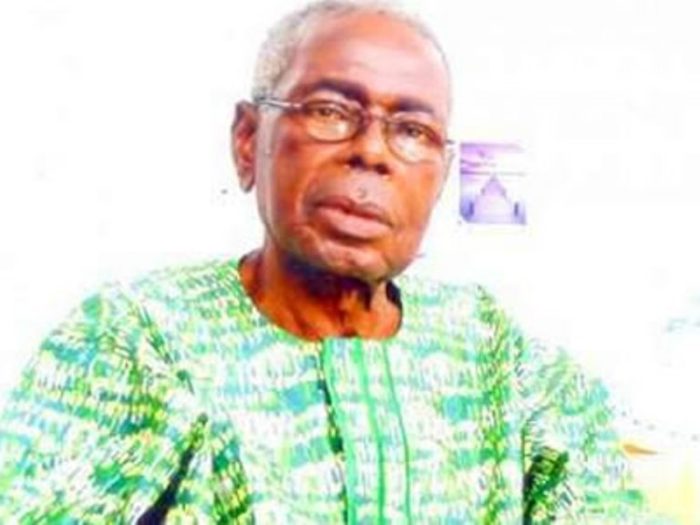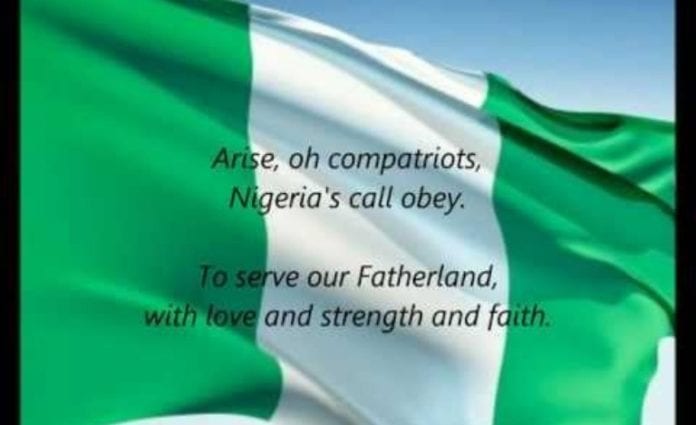The Nigerian National Anthem is an amalgamation of the work of several authors, however, it was pieced together in 1978 by Pa Benedict Odiase who was the Deputy Commissioner of Police and Nigeria Police Band’s Director of Music at the time.
The Pledge, on the other hand, was written two years before the anthem (in 1976) by Prof (Mrs) Felicia Adebola Adedoyin.
While most of the Nigerian population today are familiar with the “Arise, O Compatriots” national anthem, very few know that it was not the first anthem that was adopted by the country. The history of Nigeria’s national song is quite deep and started from amalgamation in 1914, when the governor of both the Northern Nigeria Protectorate and the Colony and Protectorate of Southern Nigeria, Lord Frederick Lugard, signed a document to consolidate the two. However, the anthem we recite today was birthed in 1978, more than six decades after the amalgamation, 18 years after the country’s independence, and eight years after the gruesome Nigerian civil war. For this write-up, we will x-ray the history of the Nigerian national anthem and pledge, the authors, and composers.
Nigerians Sang The British National Anthem Before Adopting Her Own
In the course of her history, the most populous black nation in the world has had several national anthems. After amalgamation in 1914, Nigeria didn’t have an official national song but rather recited Britain’s national anthem titled God Save the Queen. This became her patriotic song until it was changed at independence in 1960.
“God Save The Queen” Lyrics (standard version)
God save our gracious Queen!
Long live our noble Queen!
God save the Queen!
Send her victorious,
Happy and glorious,
Long to reign over us:
God save the Queen!
O Lord our God arise,
Scatter her enemies,
And make them fall:
Confound their politics,
Frustrate their knavish tricks,
On Thee our hopes we fix:
God save us all.
Thy choicest gifts in store,
On her be pleased to pour;
Long may she reign:
May she defend our laws,
And ever give us cause,
To sing with heart and voice,
God save the Queen!
The National Anthem Changed After Independence
When the imperial masters finally granted Nigeria independence in 1960, there was the need to create an official national anthem for the newborn country. This task was undertaken by Lillian Jean Williams and Frances Berda who set to work to come up with the anthem entitled Nigeria, We Hail Thee.
While Williams took charge of creating the lyrics, the song was composed by Berda and was released in 1960 in celebration of freedom from the United Kingdom. For almost 18 years, Nigerians recited the song but things took a new turn in 1978.
“Nigeria, We Hail Thee” Lyrics
Nigeria, we hail thee,
Our own dear native land,
Though tribe and tongue may differ,
In brotherhood, we stand,
Nigerians all are proud to serve
Our sovereign native land
Our flag shall be a symbol
That truth and justice reign,
In peace or battle honor’d,
And this we count as gain,
To hand on to our children
A banner without stain.
O God of all creation,
Grant this our one request,
Help us to build a nation
Where no man is oppressed,
And so with peace and plenty
Nigeria may be blessed.
The Anthem Faced a Barrage of Criticisms
From the moment “Nigeria, We Hail Thee” was introduced to the nation, the anthem didn’t go down well with many Nigerians and thus, it faced a barrage of criticisms. Citizens of the country fought against the anthem so fiercely that a rebellious campaign was launched by the Yoruba tabloid The Daily Service, which was run by the Egbé Ọmọ Odùduwà political organization. The campaign went on for many years before coming to an end in 1978 after a committee was established to begin collecting signatures as a petition.
The Second Nigerian National Anthem was Adopted After a National Contest
It was in 1978 that the old anthem finally gave way for the present Arise, O Compatriots anthem. This happened after the then leadership of Nigeria took the decision to change the controversial national anthem. A national competition was announced for it and citizens were invited to submit their lyrics. This contest was done under the sponsorship of the National Publicity Committee on the Draft Constitution and Return to Civilian Rule in Nigeria. Five winners were subsequently announced and their lines were picked for the final composition.
The distinguished Nigerian nationals were:
- John A. Ilechukwu
- Eme Etim Akpan, B. A.
- Ogunnaike, P. O.
- Aderibigbe
- Sota Omoigui

One interesting fact about these co-authors of the present Nigerian national anthem is that most of them were either teens or young adults at that time. Thus, we can say that it is thanks to the then Nigerian youths that we have what we recite today.
Setting the Lines to Music
After selecting the lines they deemed as most suitable, the special committee handed the baton over to a distinguished member of the Nigerian Police, Pa Benedict Odiase, to compose the music. The composer, who served as a Deputy Commissioner of Police, was also in charge of the Nigeria Police Band as its Director of Music. He took all the entries and went ahead to piece them together, giving rise to what we know today as the Nigerian National Anthem. Unfortunately, Pa Odiase died in 2013 and according to the records, he was never compensated for the feat he achieved for the nation.
Going by what we have above, it is rather difficult to say exactly who wrote the present Nigerian national anthem since it is an amalgamation of the work of several authors (top five winners from the context). Besides, the touch of an incredibly gifted composer must always be acknowledged.
“Arise, O Compatriots” Lyrics
Verse 1:
Arise, O compatriots
Nigeria’s call obey
To serve our fatherland
With love and strength and faith
The labor of our heroes past
Shall never be in vain
To serve with heart and might
One nation bound in freedom
Peace and unity.
Verse 2:
Oh God of creation
Direct our noble cause
And guide our leaders right
Help our youth the truth to know
In love and honesty to grow
And living just and true
Great lofty heights attain
To build a nation where peace And justice shall reign.
Though the anthem comes in two distinct verses, Nigerians usually recite only the first verse. The second verse is only recited on very special occasions as “The National Prayer.”
With Nigeria being a multi-lingual society with three major languages, the decision was taken to translate the song into two local languages; Hausa and Yoruba, for convenience and understanding of the grassroots.
Yoruba Version
Dide eyin ara .
Wa je-pe Naijiria,
ka fife sin ‘lewa
pelu okun ati ‘gbagbo
Ki ise awon akoni wa
ko ma se ja sa-san,
Ka sin tokan-tara
ile tominira wa,
ti alafia so-dokan.
Hausa Version
Yaku ‘yan Nijeriya ku farka;
Ku amsa kiran Nijeriya;
Domin mu taimaki ƙasarmu ta haihuwa;
Don aiki ga ƙasata cikin soyayya da riƙon gaskiya;
Domin gudumawar da shuwagabaninmu ‘yan kishin ƙasa suka bada;
kada ta zama a banza;
Muyi aiki da zuciya ɗaya da girmamawa a gareta;
Domin ta kasance ƙasa ɗaya mai yanci ga kowa tare da haɗin kai da zaman lafiya.
The Pledge
The Nigerian pledge of allegiance are lines recited immediately after the playing of the national anthem. The pledge precedes the current national anthem as it was written two years before the anthem in 1976. The author of the pledge is Prof (Mrs.) Felicia Adebola Adedoyin, a Nigerian of Yoruba descent from present-day Oyo State who was born in 1938. She is one of the princesses of the Iji house of Saki and was the second out of six children.
The professor’s children who attended school in America and Ghana had the tradition of reciting pledges and out of curiosity, asked their mum why they never read any pledge during their years in Nigeria. After explaining that Nigeria had no national pledge, Felicia was inspired to pen what we all recite with pride today as the Nigerian Pledge.
In July 1976, her work was carried by The Daily Times publication in an article captioned “Loyalty to the Nation, Pledge”. A common friend of the author and Gen. Olusegun Obasanjo, Barrister Adewusi, read the article and brought it to the General’s attention. Obasanjo, who was head of state at the time, eventually took the decision to make Felicia’s work the official pledge of Nigeria.
Lyrics of the Nigerian Pledge
I pledge to Nigeria my country.
To be faithful, loyal, and honest.
To serve Nigeria with all my strength
To defend her unity and uphold her honour and glory
So help me God. Amen
